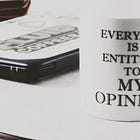'Reading this piece served as a catalyst for a mindset shift'
🌐 Waseem Hassan on breathing new life into work through communication.
FROM THE EDITOR’S DESK
WorldWise reader—
In January 2021, an email popped up in my inbox from Waseem Hassan, a chemist from Pakistan. He had come across a news article I’d written for Nature back in 2018, about Pakistan and Egypt rising the global ranks in research production. And he wanted to know how to go about publishing something along the same lines.
I really wasn’t expecting a response to that news piece. It was fairly straight-forward reporting on scientific production trends, a simple job assigned by an editor who knew this was a beat well in my comfort zone. But otherwise, Waseem’s email wasn’t a huge surprise—it happens fairly often that someone writes in after an article gets published, maybe with a comment or a query related to media work.
I sent a brief reply pointing him in the right direction and for a while, that was that. But then I heard from Waseem again.
Eventually, it dawned on me that the modest news piece had inspired a turning point for this scientist. After a Zoom chat I invited Waseem to capture the experience in writing—because in that conversation, I understood that the shift he was describing is really about something more universal than the challenges of doing research in a low-income country.
When we’re back to a normal schedule I’ll share my thoughts about that, and about how it connects with the global issues we think about in this space. For now, read on to Waseem’s account and lessons learned in today’s guest article.
Anita

INSIDER | views & experience
How a Nature article inspired me to push past limitations
By Waseem Hassan
Working as a researcher in Pakistan is far from easy. Universities suffer from poor financing and infrastructure. There’s a lack of collaboration opportunities. And the academic environment is still dominated by traditional structures that tend to compartmentalise knowledge into distinct disciplines.
Add to this a lack of awareness and misconceptions about qualifications. Some officials who decide grants have little knowledge of basic concepts in science. Once, when I was starting out, a senior researcher suggested I needed a mathematics qualification to make a fairly simple calculation for our project.
It all adds up. Far from feeling a sense of accomplishment or excitement, I found myself deeply disheartened. My research journey began to seem more like a tedious chore than a rewarding exploration of knowledge.
But then, unexpectedly, something shifted.
In 2019, I came across a news piece published in the esteemed journal Nature. The article highlighted Pakistan’s progress in research on a global scale. This was a foreign science journalist, writing on an international platform, with a story that showed appreciation for research in my country.
Reading this piece served as a catalyst for a mindset shift that not only addressed my initial concerns, but also fuelled a renewed vigour for exploration. Instead of focusing on challenges and limitations, I realised that a positive and appreciative approach could be more effective.
Anyone facing the significant challenges of doing research in a low-income country like Pakistan has to consider taking one of two distinct paths. They can choose to embark on a critical narrative—blaming the system and highlighting the country’s negligible progress in the sector. Or, they can opt to explore evidence of where a country, region, and yes, even us as individuals, are making positive strides despite the challenges.
I took inspiration from the Nature article, and I chose the latter.
Together with colleagues, we explored Pakistan’s research growth rates in chemistry and material sciences and compared them with over 40 other countries. We did this using data since 2001, rather than the single year the news piece reported on. We published the findings in the Journal of Chemical Society of Pakistan and Proceedings of the Pakistan Academy of Sciences.
In other articles, published in JMIR Dermatology and Diabetes & Metabolic Syndrome: Clinical Research & Reviews, we also reported on results after applying a range of performance indicators to gauge research output and impact across India, and in Africa, in various fields like dermatology and diabetes.
We delved into many more indicators—I’ll be happy to share with anyone interested to know more.
But I wanted to take this inspiration even further, to focus on the people working in research. I published a piece in one of the world’s best dermatology journals, highlighting the "Top authors in dermatology", later extending this approach of analysing performance indicators to present other researchers’ varied accomplishments in other disciplines, such as cardiology. The latest piece, co-authored with US-based researchers, has just been accepted for publication in the prestigious Educational Psychology Review.
I also used this approach to challenge myself.
After overcoming initial reservations, which were fuelled by anxiety and self-doubt, I actively sought out collaboration opportunities. Navigating through the process, I realised that collaboration extends far beyond merely sharing publications—it's about leveraging unique strengths and perspectives to create synergies that drive impactful research. I am thrilled to be collaborating with researchers from the United States, Brazil, Canada, India, and Australia.
Closer to home, I approached COMSTECH, the Ministerial Standing Committee on Scientific and Technological Cooperation of the OIC (Organization of Islamic Cooperation), a respected scientific organisation based in Islamabad. My suggestion was to work with the organisation on compiling descriptive reports covering the research output of all 57 countries of the OIC for ten years (2013-2023). The idea was approved. Some of the reports are now available on their webpage.
Of course, like almost every author, I experienced rejections and the dejection that comes with it. But the shift in mindset also meant that I looked at reviewers’ comments in a new light. I realised that, in many respects, they were right in their criticism. In fact, I gained valuable insights and knowledge from those rejections. And I took heart from the positive comments that came my way from world-class researchers.
Throughout my journey, there were people who discouraged me, and there were others who surprised me by offering unwavering support and motivation. I’m now sharing my experience in the hope that it helps others who are facing what may seem—or may be, in fact—a difficult path to pursue research, or work in any field that generates knowledge, especially in nations that are struggling with financial issues and limited resources.
Here are a few lessons I’ve learned along the way:
#1. In the face of financial constraints and resource limitations, it's easy to dwell on challenges. However, the pivotal lesson is to embrace a positive and appreciative mindset. Look for the silver linings, celebrate small victories, and acknowledge the efforts of individuals and the collective research community.
#2. Take inspiration from instances where international recognition shines a spotlight on the achievements of your country or region.
#3. Communicate proactively and seek collaborations both locally and internationally.
#4. Use milestones and anniversaries of journals or organisations as opportunities to contribute. Celebrate their achievements by publishing research articles or letters. This not only adds value to your portfolio, but also fosters positive communication within the global scientific community.
#5. Strive to strike a balance between appreciation and constructive criticism. While it's crucial to address challenges, a positive and appreciative approach can be more conducive to building relationships, gaining support, and fostering a collaborative spirit.
#6. When faced with a lack of awareness or misconceptions, approach communication with humility. Educate colleagues and decision-makers patiently. This will help to ensure that your proposals and initiatives are understood and valued.
👤 Waseem Hassan is a 44-year-old chemist from Charsadda, in the Khyber Pakhtunkhwa province of Pakistan, currently working at the University of Peshawar. He received his PhD in 2009 from UFSM, The Federal University of Santa Maria, in Brazil. You can contact him at: waseem@uop.edu.pk
This article was edited for length and clarity.
RELATED | from the archive
Thank you.
WorldWise is read across 67 countries—it remains independent thanks to the support of subscribers like you, and to the rest of my nomadic work-life. Sign up | Browse the archive | Sponsor an issue
Created and edited by Anita Makri—journalist/writer, producer and editorial adviser covering global development and science in society. I also help selected organisations with compatible values to strengthen their media work. LinkedIn | Instagram | Email






